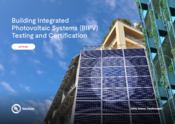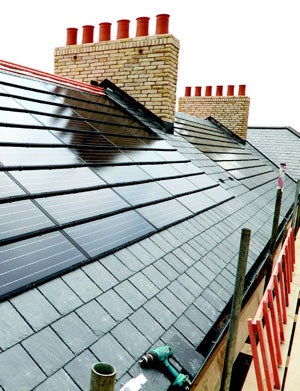
Building Integrated Photovoltaic Systems (BIPV) Testing and Certification E-book
UL Solutions testing and certification solutions to help support the safe use of building integrated photovoltaics.

As solar photovoltaic (PV) technology matures it is increasingly being integrated into building construction and used to replace conventional materials in parts of the building envelope such as roofs, curtain walls, and windows. As conventional roof installations continue to increase and PV prices decrease, Building Integrated Photovoltaics (BIPV) are gaining popularity. Architects are now integrating the technology into their designs for the aesthetic value while helping building owners save on their cost of electricity with environmentally friendly generation. Furthermore, BIPV is a means to achieve compliance with energy conservation and sustainability requirements and helps in achieving a Leadership in Energy and Environmental Design (LEED) Building certification.
 BIPV are products incorporating photovoltaic modules that also function as a component of the building envelope, and have been designed for both the basic requirements for both photovoltaic products and construction materials they are intended to replace. BIPV products are intended for mounting integrally to the structure or protective surfaces of a building in one of two primary installation methods:
BIPV are products incorporating photovoltaic modules that also function as a component of the building envelope, and have been designed for both the basic requirements for both photovoltaic products and construction materials they are intended to replace. BIPV products are intended for mounting integrally to the structure or protective surfaces of a building in one of two primary installation methods:
Currently, BIPV systems and their mounting means for roofing systems are evaluated separately for compliance to:
The safety evaluation includes electrical, temperature, mechanical loading, wind resistance, impact and fire tests. The product’s output wiring system is also investigated for conformance with the provisions of the National Electrical Code (NEC). Having one standard (UL 7103) to address all aspects of concern – electrical, fire, wind resistance, weather protection, impact resistance and durability – of this new type of building material makes it far easier to demonstrate code compliance.
The National Electrical Code (NEC), International Building Code (IBC) and International Residential Code (IRC) require that all PV products that are intended to be installed on or around a building must be certified by a Nationally Recognized Testing Laboratory (NRTL). Because of these Code requirements, all BIPV products are subjected to the same electrical certification and safety testing standards as conventional PV modules and more.
Product installation concerns for PV panel systems include:
Since some BIPV are designed to directly replace roofing material, a BIPV system must be evaluated not only as a PV module but also as a roofing material with additional Code required testing such as:
Integration of PV systems into building products and architectural designs is growing. UL Solutions' safety science leadership, regulatory expertise and experience in the building and solar industries uniquely position us as the partner of choice for testing and certification of BIPV products into the building envelope.
* The fire testing includes those tests performed under the Solar PV Module safety standard (UL 61703) and additional tests that are normally applied to roofing materials (UL 790).

Building Integrated Photovoltaic Systems (BIPV) Testing and Certification E-book
Thanks for your interest in our products and services. Let's collect some information so we can connect you with the right person.